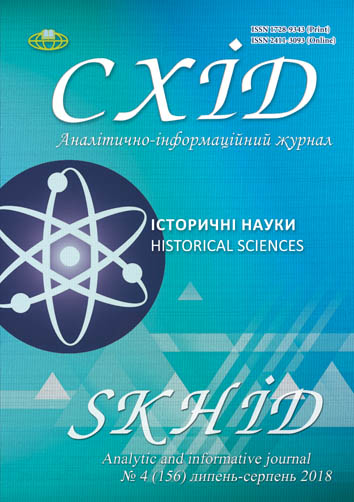«Bessarabian question» at the Paris Peace Conference (Autumn-Winter 1919 year)
DOI:
https://doi.org/10.21847/1728-9343.2018.4(156).140985Keywords:
Paris Peace Conference, «Bessarabian question», Romania, the Entente, the international law, the diplomacy, the annexation, Sen-Zhermenskiy peace treatyAbstract
The peace conference was opened in Paris in January 1919 year; it was convened by the victorious states in the First World War to sign the number of the treaties with the beaten countries. In fact, it was about the redistribution of the spheres of the political, the economic and the military influence. During 1919 year, the meeting of the conference showed that among the leaders of the coalition there was no single point of view on the future structure of Europe. The representatives of France, England, and the USA actively lobbied their own geopolitical considerations on this question. At the same time, other states that were part of the Entente also did not want to lose the chance to expand the territory and to strengthen their own political weight. One of them was Romania, which in fact annexed Bessarabia in 1918 year.
The Romanian diplomacy actively argued in Paris the exclusive right to the region, but in its aspiration it met the rigid opposition from the Allies. Only from the autumn of 1919 year, the «Bessarabian problem» began to acquire more or less distinct features in its final decision.
The aim of the research is the analysis of the political struggle around Bessarabia at the Paris Conference during the second half of 1919 year. The tasks of the publication are the characteristic of the course of the events around the adoption of the decision as for the territorial affiliation of the region during the formation of the Versailles system of the international relations. In the context of the theme, the questions were considered, which was not related only to the copposition in Paris but also to the internal policy of Bucharest which was aimed at the integration of Bessarabia into the nationwide system of the kingdom.Downloads
References
«Absolutely personally and confidently!» B.A. Bahmetev - V.A. Maklakov. Correspondence 1919-1951. Moscow: ROSSPEN. Vol. 1.
Basciani, A., 2007. La difficile unione La Bessarabia e la Grande Romania. 1918-1940. Roma, Aracne Editrice.
Brătianu, Gh. I., 1939. Acţiunea politică şi militară a României în 1919 îm Lumina corespondenţei diplomatice a Lui ion I.C. Brătianu. Bucureşti: Cartea Românească.
Bule, V., 2012. The image of the Romanian administration and the mood of the population of Bessarabia, which are reflected in the French diplomatic and reconnaissance reports of 1918-1920 years. Rusin, № 2 (28), pp. 49-54.
Documents on British Foreign Policy. 1919-1939, 1947.London: His Majesty’s Stationery Office, Vol. I: 1919.
Documents on British Foreign Policy. 1919-1939, 1948. London: His Majesty’s Stationery Office, Vol. ІI: 1919.
History of the Civil War in the USSR: in 5 Vol., 1959. Vol. 4: Decisive victories of the Red Army over the combined forces of the Entente and the internal counter-revolution (March 1919 - February 1920 year). Moscow: State Publishing House of Political Literature.
Kreutor, V., 2001. The policy of the national assimilation of the Ukrainians in Romaniain the early 20's of the XX century. Galicia Scientific and cultural-education journal. № 7, рр. 163-169.
Levit, I.E., 2012. Bessarabian Issue in the Context of International Relations (1919-1920). Paris Peace Conference. Tiraspol: Litera.
Lungu, V.N., 1979. The policy of the terror and the robbery in Bessarabia from 1918-1920 years. Chisinau: «Kartya Moldovennyaske».
Madievsky, S.A.еd., 1988. The Problems of the internal and the foreign political history of Romanian of the New and Modern times. Chisinau: Shtiince, 1988.
Muntyan, M.A., 1977. Danubeproblem in international relations (1945-1948). Chişinău: Ştiinţa.
Nazaria, S.M., 2014. The agreement between Rakovsky and Averescu on March 5-9, 1918, inthe historiography and the memoirs of the Romanian politicians. The problems of the national strategy, № 2 (23), рр. 155-165.
Popenko, Ya., 2017а. The Romanian diplomacy in the struggle for Bessarabiaat the Paris Peace Conference (January-May 1919). Kyiv Historical Studies, № 2 (5), рр. 10-17.
Popenko, Ya., 2018. The political struggle for Bessarabiaat the Paris Peace Conference during May-August 1919. Eminak, № 1 (21), Vol. 2, рр. 36-41.
Popenko, Ya.V., 2017b. The realization of the idea of the creation of «Great Romania» in foreign policy activity of Bucharest during the first quarter of the twentieth century. Scientific notes of the Vinnitsa State Pedagogical University named after Mikhail Kotsiubynsky, № 25, pp. 275-280.
Stafi, I., 2007. Spovedaniile Basarabiei. Chişinău: Bons Offices.
Sulyak, S., 2006. Rusyns during the First World War and Russian Disorder, Rusin, № 1 (3), pp. 46-65.
The Roumanian Occupation in Bessarabia. Documents by Paris Peace Conference, 1920. University of California Libraries.
Tilea, V.V., 1925. Acţiunea diplomatică a României. Nov. 1919 - Mart. 1920. Sibiu.
Vetrova, G., 2013. Features of the economic development of the Southern Bessarabia at the warehouse of the kingdom Romania(1918-1940 years). Regional studies, № 1, рр. 47-53.
Zimmerman, M.A., 1924. Essays of the new international law. Handbook for the lectures. Prague: Plamja.
Downloads
Published
How to Cite
Issue
Section
License
Copyright (c) 2018 Yaroslav Popenko

This work is licensed under a Creative Commons Attribution-NonCommercial-NoDerivatives 4.0 International License.
1. Authors bear responsibility for the accuracy of facts, quotations, numbers and names used.
2. Manuscripts are not sent back.
3. The publisher does not always agree with the authors' opinion.
4. The authors reserve the right to authorship of the work and pass the first publication right of this work to the journal under the terms of a Creative Commons Attribution-NonCommercial-NoDerivatives 4.0 International License. This license allows others to distribute (copy) the published work for non-commercial purposes, provided there is mandatory attribution to its authors and a link to the first publication in our journal.
5. The authors have the right to conclude separate supplement agreements that relate to non-exclusive work distribution in the form in which it has been published by the journal (for example, to upload the work to the online storage of the journal or publish it as part of a monograph), provided that the reference to the first publication of the work in this journal is included.

